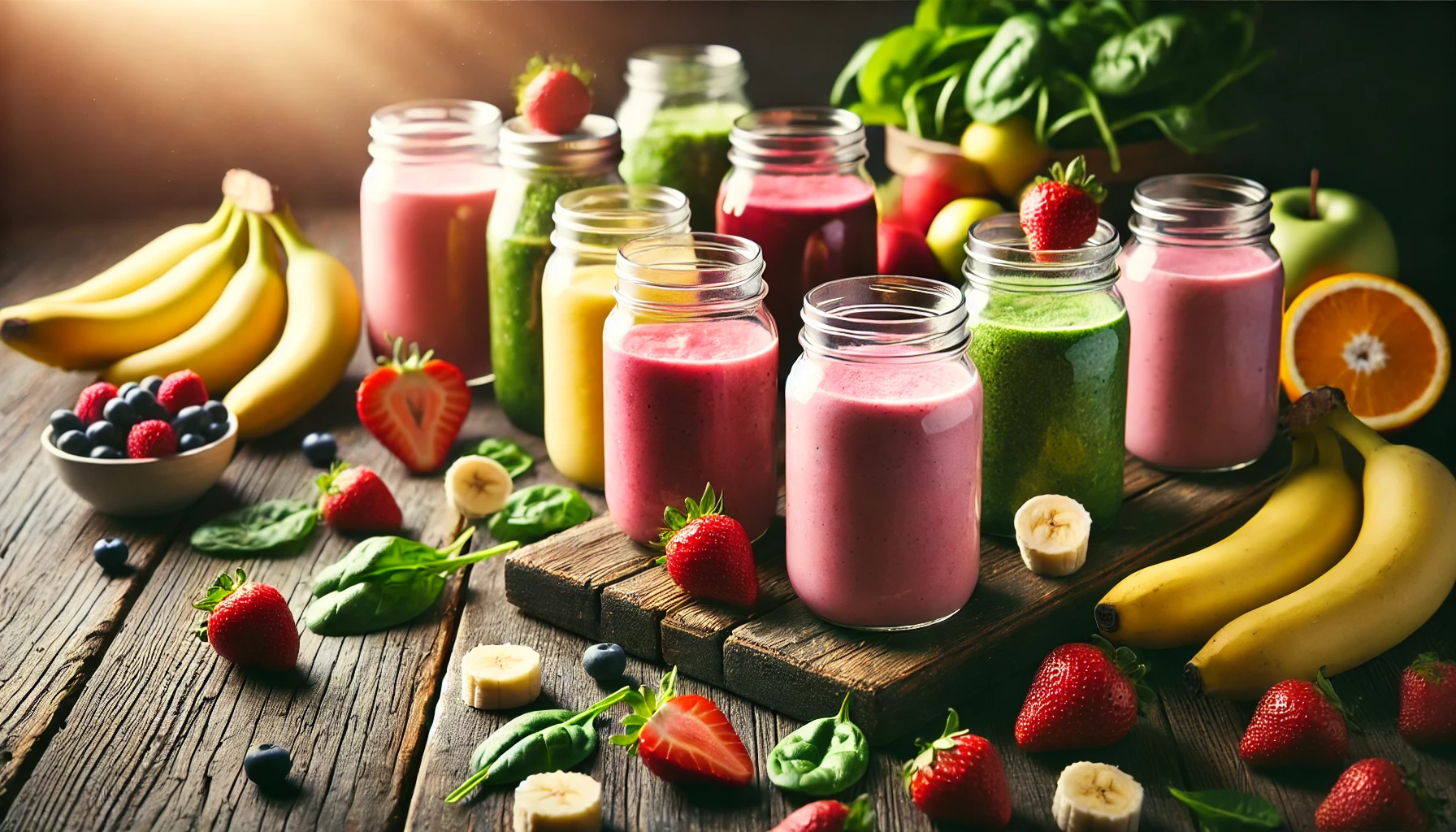The Ultimate Smoothie Diet: Shed Pounds with Delicious Blends
The Smoothie Diet emerges as an innovative 21-day program to facilitate weight loss and enhance overall health by substituting two daily meals with nutrient-dense smoothies. By prioritizing whole foods, fiber, and protein-rich ingredients while eschewing processed and sugary products, it offers a structured approach with flexibility for individual dietary needs. This diet’s potential benefits, such as increased metabolism and antioxidant-rich nutrition, are compelling; however, it raises significant questions about potential nutrient deficiencies and the risk of weight regain. Thus, exploring its benefits and challenges becomes essential for those seeking sustainable health improvements.

Smoothie Diet Benefits
One of the primary benefits of the Smoothie Diet is its potential to boost metabolism and energy levels by providing a nutrient-dense, low-calorie regimen. This diet leverages the natural richness of vitamins, minerals, and antioxidants in fruits and vegetables to create a caloric deficit while enhancing nutritional intake. As a result, many individuals experience increased fat-burning and weight loss.
Rich in antioxidants, the Smoothie Diet also reduces oxidative stress and inflammation within the body. These antioxidants, stemming from various fruits and vegetables, combat free radicals, thus promoting cell health and potentially lowering the risk of chronic diseases.
This anti-inflammatory effect can boost overall well-being and play a crucial role in sustaining energy levels throughout the day, essential for maintaining an active lifestyle.
Another compelling advantage of the Smoothie Diet is its positive impact on digestion and gut health. The high fiber content from the fruits and vegetables utilized in the smoothie recipes facilitates smoother digestion and regular bowel movements. Improved gut health can influence overall health, positively affecting everything from immune function to mental clarity.
Moreover, users of the Smoothie Diet have reported noticeable improvements in their skin and hair health. This is plausibly due to the diet’s significant essential vitamins and minerals intake. Nutrients like vitamin C, known for its collagen-boosting properties, and biotin, which supports hair health, are naturally abundant in the diet’s core ingredients.
These nutritional benefits foster holistic well-being and revitalization, making the Smoothie Diet appealing for those seeking health and vitality.
Foods to Eat and Avoid
The 21-Day Smoothie Diet emphasizes consuming nutrient-dense whole foods such as fruits, vegetables, nuts, seeds, and lean proteins while advising against processed and sugar-laden items to optimize weight loss and overall health.
Bananas, spinach, and almond milk are central to this smoothie diet. Together, they contribute to delicious and healthy smoothies that provide essential nutrients and support satiety.
The emphasis on fruits and vegetables ensures a high intake of fiber, vitamins, and minerals, all crucial for maintaining energy levels and promoting weight loss.
Including whole grains such as quinoa, alongside protein sources like chicken, not only diversifies the diet but also ensures balanced nutrition.
Together, these components form the foundation of the smoothie diet, encouraging the consumption of whole foods to foster a healthier lifestyle.
Conversely, the diet advises against processed foods, often high in unwanted additives, unhealthy fats, and sugars.
Bacon, white rice, French fries, cookies, and soda are discouraged due to their high caloric content and minimal nutritional value.
They can drastically hinder weight loss efforts and negatively impact overall health.
While fruits are a staple in creating a healthy smoothie, the diet warns against excessive calorie intake from sugar-rich foods.
Moderation ensures that fruits’ natural sugars do not impede weight loss goals.
Following these guidelines, participants can achieve a well-rounded, nutrient-dense diet supporting weight loss and sustained health improvements.
Embracing this balanced approach to food selection is vital to maximizing the benefits of the 21-Day Smoothie Diet, which facilitates a path to both short-term and long-term health gains.
Weight Loss Recipes
Incorporating well-crafted weight loss recipes is integral to the Smoothie Diet’s success in achieving significant and sustainable results.
The well-balanced smoothie recipes are the cornerstone of this 21-day plan, promoting weight loss while providing essential nutrients. These delectable smoothies are designed to replace two meals daily, ensuring you stay satisfied with wholesome, nutrient-dense ingredients.
The smoothie diet features 36 carefully curated recipes, each incorporating a variety of fruits, vegetables, nuts, seeds, and alternative milk such as almond or coconut milk. This focus on whole, minimally processed foods contributes to a balanced diet, energizing the body and aiding in digestion and gut health.
Many recipes include protein-rich ingredients like Greek yogurt or protein powder to enhance weight loss benefits. These ingredients help build muscle and keep you feeling full longer.
The smoothie diet’s flexibility allows for modifications based on individual calorie needs and preferences. For busy individuals, these nutritious smoothies offer a quick, healthy alternative to traditional meals without sacrificing quality or taste.
The dense nutritional content helps users achieve an average weight loss of 10-15 pounds over 21 days, as reported by numerous participants.
Furthermore, the diet plan is complemented by a maintenance plan focusing on these habits’ long-term sustainability. This ensures that the weight loss achieved is immediate and enduring.
Health Considerations
Navigating the health considerations of the 21-day Smoothie Diet requires a thorough understanding of both its benefits and potential risks. The diet promises rapid weight loss by replacing two meals with smoothies, but this strategy can have varied health implications. While weight loss is often seen as a positive outcome, the health of dieting must be holistically evaluated.
Due to its restrictive nature, the 21-day Smoothie Diet can lead to nutrient deficiencies. By omitting diverse food groups, dieters may experience a decline in essential nutrients like protein and healthy fats. Such nutrient deficiencies can adversely affect overall health, potentially lowering energy levels, impairing muscle mass maintenance, and affecting metabolic functions.
Additionally, the smoothie diet’s high sugar content from fruits can be detrimental, especially for individuals with medical conditions such as diabetes. Excessive sugar intake might destabilize blood sugar levels, presenting a health risk contrary to the intended benefits of weight loss. Effective weight management should balance calories, protein, carbohydrates, and healthy fats, which this diet may find challenging.
The health risks extend to specific populations, including children, pregnant or nursing women, and people with pre-existing health conditions. For them, the smoothie diet can exacerbate nutrient deficiencies and lead to unforeseen health complications.
Moreover, due to a lack of scientific support and potential harm, the National Center for Complementary and Integrative Health cautions against detox diets, including the 21-Day Smoothie Diet.
Getting Started
Embarking on the 21-Day Smoothie Diet begins with clearly understanding the program’s structure and meal replacement strategy. The central premise involves replacing two meals per day with nutrient-dense smoothies derived from the provided e-book recipes. This deliberate swap forms the backbone of the weight loss plan, generating a calorie deficit crucial for effectively shedding excess pounds.
To begin with, it’s essential to familiarize oneself with the various smoothie recipes, ensuring that the ingredients align with dietary preferences and any existing health considerations. Each smoothie should be fiber-rich to enhance satiety and contain at least 50 grams of protein daily to support muscle maintenance. This addresses a potential pitfall of liquid diets, where fullness might be compromised compared to solid meals.
The program also emphasizes one solid meal per day alongside two healthy snacks, limiting the total daily calorie intake to approximately 1,500 calories. This structured approach ensures a balanced intake while maintaining the calorie deficit required for weight loss. Selecting whole foods high in nutrients for solid meals and snacks is crucial, as this will bolster the diet’s overall efficacy and help manage hunger levels.
For many, the Smoothie Diet offers flexibility and the ability to cater to individual caloric needs, which is advantageous. However, awareness of potential challenges like increased hunger or weight regain post-program is vital. Continuous adherence to the diet, supplemented by the transition guide provided, can fortify long-term weight management.
Conclusion
The Smoothie Diet’s structured approach to weight loss and health enhancement, emphasizing whole foods and nutrient density, offers notable benefits.
These benefits include increased metabolism and antioxidant intake.
However, careful consideration of potential nutrient deficiencies and the risk of weight regain is crucial.
Tailored, high-fiber, and protein-rich recipes provide flexibility.
However, adherence to dietary guidelines is essential for success.
The program presents a compelling option for those seeking a balanced, nutrient-focused dietary regimen.

